Common Council backs Mideast Cease-Fire during heated, chaotic session
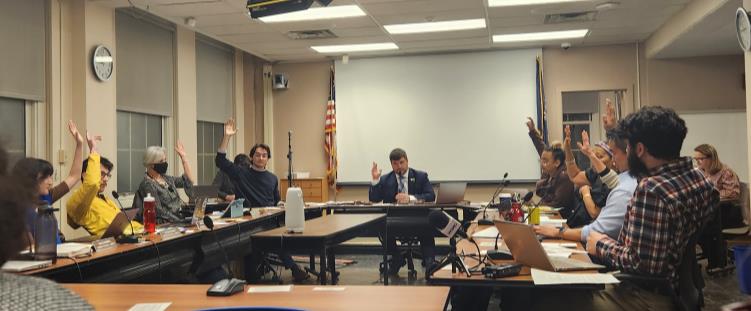
Reporting and Analysis by Robert Lynch, March 7, 2024
Ithaca Common Council gave pro-Palestinian activists most of what they’d asked for Wednesday night. But it did so in the most turbulent of ways. And by the time its three-hour meeting had ended, many, including the secretary, were comparing notes to make sure they knew exactly what Council had just done.
City Hall’s undersized meeting chambers were packed to nearly the Fire Marshall’s limit. Even before discussions began, one Alderperson folded his computer and temporarily walked out in anger because of a banner attendees had unfurled. More than two dozen public commenters spoke. But far more partisans populated the room, perhaps 60-70 people in all. Unrestrained, sometimes rude, those in attendance spoke freely and loudly and often out of turn when a Council member’s statement registered the gallery’s approval or displeasure. Manners were few. Passions ran high. Council that night had free-range guests.
Draft language came and went during that night. Wording was amended ad hoc on the floor. The “weaponized” term of “terrorism” was struck; the word “genocide” plunked back in. In this reporter’s 54 on-and-off years of covering these types of things, Wednesday’s meeting of Council stood as among the most chaotic. Maybe it’s what happens when a youthful cadre of idealistic liberals takes the reigns of municipal government a bit too soon and grinds political sausage with the best of intentions. It wasn’t pretty.
“These children in Palestine will never know what it’s like to play on a playground, to have fun, to swing, to swim, ‘cause they’re always ducking and hiding,” Alderperson Phoebe Brown, Council’s most passionate supporter of the Cease-Fire Resolution, stated near the close of the never-ending debate. “So I want us to do something to let the world know that Ithaca feels them… Ithaca wants them to have peace like us.”
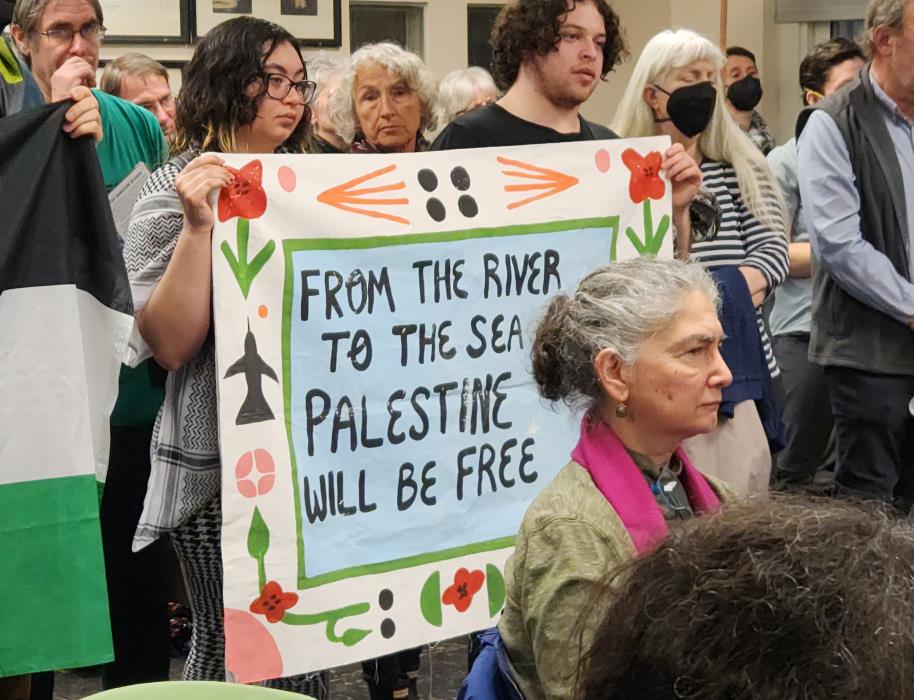
In the end, what passed was a cobbled-together, tempered, six-point Resolution that expressed Common Council’s “statement of support for the U.S. Government to do everything in its power to influence the parties” to achieve “a permanent negotiated bilateral cease-fire” to the Israel-Hamas war. The Resolution also urged the parties to “codify the right to self-determination of both the Israeli and Palestinian people,” and to “release all civilian hostages held by Hamas.”
Additionally included were calls for work toward a “strong and enduring” Middle East peace, the end of Israel’s indefinite detention of Palestinians held without charge, and the unrestricted access of humanitarian aid into Gaza.
Inserted during the final minutes of debate as a crucial seventh provision was this: The end to U.S. military funding to the State of Israel.
Council’s much-amended Cease-Fire Resolution passed nine votes to two. Alderperson David Shapiro (the man who’d walked out) voted against it. So did Pierre Saint-Perez. He would have referred the matter to a committee or working group to give it a well-rested and level-headed rewrite. Who could blame him?
Drama came early, even before the many had trooped to the mics. As City Hall honored Ithaca’s Youth Council, and as a couple of County legislators tried to explain assessments, demonstrators all the while held up a quilt-sized banner emblazoned with the Hamas battle cry, “From the River to the Sea, Palestine Will be Free.”
“Excuse me, I’d like to jump in here,” Alderperson David Shapiro interrupted. “I find that sign to be very anti-Semitic.”
As Mayor Robert Cantelmo tried to rule him out of order, but without success, the Third Ward Alderperson plowed forth.
“We have people taking up space here with racist signs,” Shapiro continued, noting the packed room’s fire hazard. “These are racist signs. We would not be allowing racist signs (critical) of other religions, of other cultures. We would not be allowing other people to stand here with ‘All Lives Matter’ signs. We would not be allowing people to do that here.”
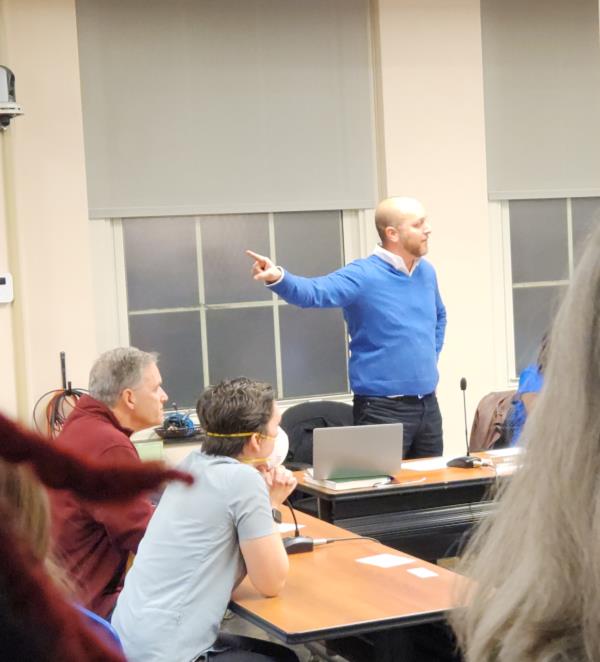
“We object to things that are hateful,” Shapiro went on. And to attendees, he alleged, “You’re probably learning from some of these professors in town who are saying all these hateful things to our kids…. We should not be conducting business in here with these racist things being placed in front of us.”
The banner remained. But for a time, Shapiro did not. After his 90-second outburst, the Council member quietly folded his laptop and exited the room. He returned about 30-minutes later, cooler, but with the banner and Palestinian flag still where they were before.
Those who addressed Common Council Wednesday were many of the same who’d pleaded unsuccessfully to the Tompkins County Legislature at a trio of meetings in January and February to adopt cease-fire supportive resolutions which at their four corners were much the same as what Council considered. Though the County’s Resolution obtained plurality support from members attending the Legislature February 6th, it fell one member short of an eight-vote majority. It has never since gained reconsideration.
As at the Legislature, those speaking to Common Council Wednesday represented a largely-unbridged generational divide. Most were either very young or very gray, with few in-between.
Freshman Alderperson Kayla Matos had lured Wednesday’s standing-room-only crowd to Council Chambers. She’d filed her cease-fire Resolution the previous Friday. Matos and First Ward ally Phoebe Brown hail from the “Solidarity” wing of progressive Democrats, and they two-teamed what was first put onto the floor.
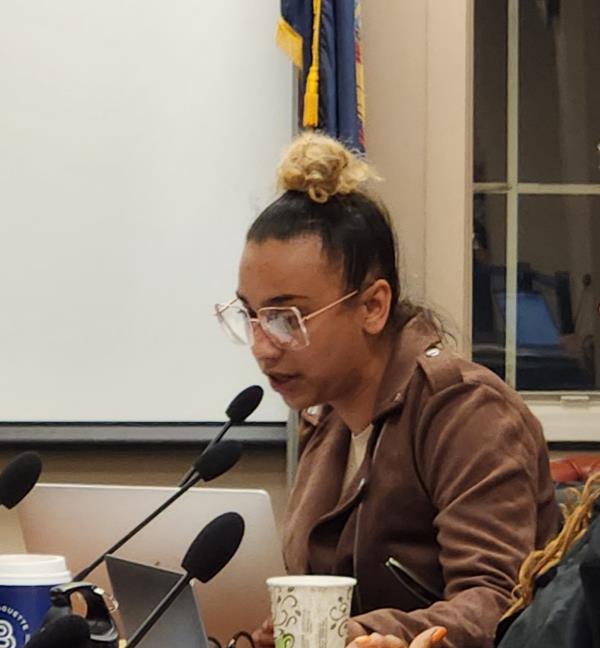
Matos’ Resolution was the only version on the night’s agenda. Its 16-paragraph justification of a cease-fire skewed critical to Israel and friendly to Palestine. It accused President Biden of remaining “supportive of (Israel’s) strategy of warfare and besiegement” in Gaza and alleged that Israel “has bombed Palestinian civilians and infrastructure indiscriminately.” It spoke of Israeli “genocide,” but offered next to nothing critical of Hamas. It carried strong language. Most of Matos’ Resolution did not survive the night.
“I feel a little bit dissuaded,” Cornell-student Alderperson Patrick Kuehl spoke up after Matos moved her Resolution and Brown had seconded it. At the last Council session, Kuehl maintained, members had agreed to work together on a cease-fire Resolution “that spoke from Ithaca to its core,” he said. And “that wasn’t really accomplished” by what Matos had offered.
What Kuehl did next was to offer an “amendment,” in truth, a substitute Resolution, crafted behind the scenes during the previous 24-48 hours. It stripped away all that Matos and Brown had offered, and exchanged it for a crisper version, one that discarded many of the original accusations of specific Israeli misdeeds and bent over backwards to commend President Biden and Vice President Kamala Harris for their efforts to bring peace to the conflict.
After arduous debate and a slew of additional amendments Kuehl’s substitute passed 9:2 and replaced Matos’ original.
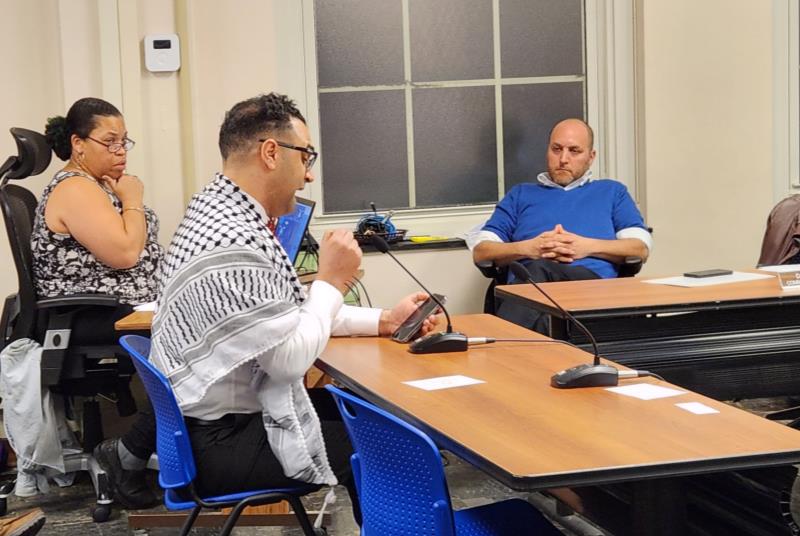
Far more neutral in its assessment, the Kuehl draft, while acknowledging the “catastrophic loss of life” in Gaza and the deaths of more than 30,000 in the territory, also took note of Hamas’ October 7th attack on Israel and the 1,139 deaths it had caused. Moreover, Kuehl devoted three paragraphs to commending President Biden for having “condemned the Netanyahu government’s response” to the Hamas attacks, and for Vice President Harris’ call for “an immediate ceasefire” and for her appeal for the Netanyahu government to do more to increase the flow of humanitarian aid.
The audience did not greet praise for the Biden Administration kindly. And neither did Alderpersons Brown or Matos.
“Harris and Biden did not ask for a cease-fire,” Brown asserted, “so to even use that language here is very deceiving.”
The Administration’s call was for only a temporary cease-fire, not a permanent one, Matos clarified. “It is extremely watered-down,” Matos said of Kuehl’s substitute. “This does not reflect the tragedies that the people are going through.”
Only Matos and Brown opposed replacing Matos’ version with Kuehl’s facially-neutral compromise. Members would go on to retain Matos’ original title, rather than Kuehl’s more Biden-deferential compromise. And on Alderperson Tiffany Kumar’s initiative, passed 7:4, Council deleted all references to “terrorist” in the final adopted version.
Alderperson Saint-Perez questioned the need for linguistic change as applied to Hamas, an “internationally recognized” terrorist group, he said.
“I think we can call it wrong. I think we can call it terrible,” Kumar responded. “But I think that the use of the word ‘terrorist,’ regardless of what it technically means, the dictionary definition of it is, has been weaponized against all brown people, including people who look like me and my family.” Kumar is Asian.
The only remaining substantive change, moved by Matos and adopted narrowly, added back the original Resolution’s seemingly out-of-place clause that referenced South Africa’s allegation before the International Court of Justice at the Hague that “acts and omissions by Israel… are genocidal in character.”
Amending a document “ad-hoc” in the middle of a meeting “is a terrible way to craft policy,” Saint-Perez observed. “This is a messy process that I believe will lead us to a final product that doesn’t reflect the needs and beliefs of our community… and just is not coherent at achieving the goals that we wanted to achieve.” He called the night’s legislating “dysfunctional.”
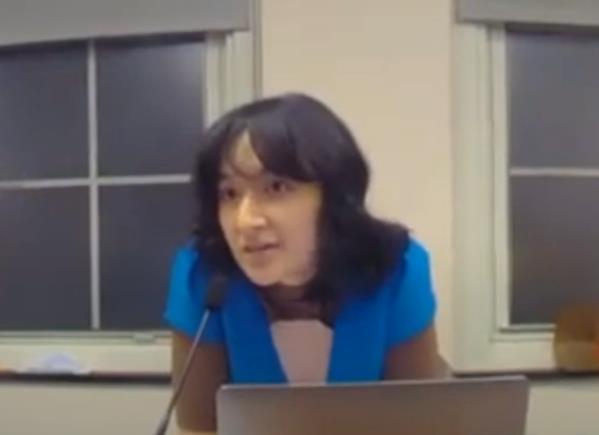
Saint-Perez would have preferred delay and committee review, as well as a broader approach that draws in other world conflicts, not just Gaza. His argument lost. The majority craved action… and action that night.
“As we sit here this very night, there are children starving; there are grandmothers dying,” Brown reminded colleagues, pleading passionately for a prompt vote. “So if we sit here and discuss this all night long—‘cause I’ll be up ‘til four in the morning; it’s fine with me, because this is a serious matter.”
“We’re all going to get up from here’ go home to our comfy house; kiss our cat, kiss our dog; whatever we do when we get home,” Brown, wound up and animated, continued. “We are going to leave here all right, tonight; not those babies, not those hostages. So whatever we do tonight, let’s make a stand for them all.”
Council didn’t stay up until Four AM. It just sometimes felt that way. In the end, Council accomplished what the Tompkins County Legislature could not do. A Cease-Fire Resolution, no matter how strong, no matter how weak, is on the City of Ithaca’s record and is on its way to Washington, the first known municipal resolution of its kind locally. Others may follow, but Ithaca went first… for whatever good it does. Maybe none at all.
But we who took notes Wednesday night had a workout. We watched the new Common Council grind meat its own way.
###

